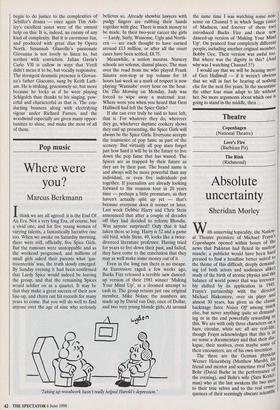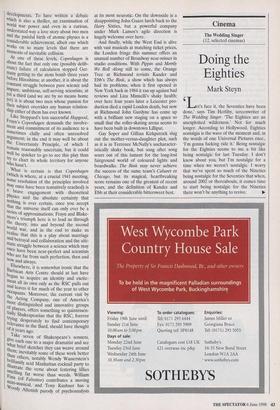Theatre
Copenhagen (National Theatre) Love's Fire (Barbican Pit) The Rink (Richmond)
Absolute uncertainty
Sheridan Morley
With unnerving topicality, the Nation- al Theatre premiere of Michael Frayn's Copenhagen opened within hours of the news that Pakistan had flexed its nuclear muscle; a publicist would have been hard pressed to find a headline better suited to the theme of this difficult, deeply demand- ing (of both actors and audiences alike) study of the birth of atomic physics and the balance of world power that was irrevoca; bly shifted by its application in 1.94' Frayn's partnership with the director Michael Blakemore, over six plays art.d almost 30 years, has given us the classic backstage farce Noises Off among Much else, but never anything quite so demand- ing or in the end powerfully rewarding as this. We are with only three characters on a bare, circular, white set: all are real-111,e, though Frayn acknowledges that this is .111 no sense a documentary and that their dia- logue, their motives, even maybe some of their encounters, are of his own invention: The three are the German physiciSt Werner Heisenberg (Matthew Marsh), !its friend and mentor and sometime rival Niels. Bohr (David Burke in the performance of the evening), and Bohr's wife (Sara Kestel- man) who at the last awakens the two in ell to their true selves and to the real con.sc" quences of their seemingly obscure scientific developments. To have written a debate Which is also a thriller, an examination of world war power and even in a curious, understated way a love story about two men and the painful birth of atomic physics is a considerable achievement, albeit one which works on so many levels that there are Moments of inevitable collision.
At one of these levels, Copenhagen is about the fact that only one (possibly delib- erate) failure of calculation stopped Ger- many getting to the atom bomb three years before Hiroshima; at another, it is about the constant struggle between pure science and impure, ambitious, self-serving scientists; at Yet a third (and we are by no means home Yet) it is about two men whose passion for their subject overrides any human relation- ship either of them has ever known.
Like Stoppard's less successful Hapgood, FraYh's Copenhagen demands the involve- ment and commitment of its audience to a sometimes chilly and often unresolved argument; in the end it may well be about the Uncertainty Principle, of which I remain reasonably uncertain, but it could well be quicker to go to see this play than try to chart its whole territory for anyone Who hasn't.
What is certain is that Copenhagen (Which is where, at a crucial 1941 meeting, some resolution of the principles involved may once have been tentatively reached) is a brave engagement with theoretical Physics and the absolute certainty that nothing is ever certain, once you accept that the universe itself can only ever be a series of approximations; Frayn and Blake- more's triumph here is to lead us through the theory, into and beyond the second world war, and in the end to make us realise that this is a play about marriage and betrayal and collaboration and the ulti- mate struggle between a science which may once have been near-perfect and scientists who are far from such perfection, then and now and always. Elsewhere, it is somewhat ironic that the ,Barbican Arts Centre should at last have begun to acquire an identity and excite- ment all its own only as the RSC pulls out and leaves it for much of the year to other occupants. Moreover, the current visit by the Acting Company, one of America's Most distinguished and innovative groups of players, offers something so quintessen- tiallY Shakespearian that the RSC, forever trYing desperately to find contemporary relevance in the Bard, should have thought of it years ago. Take seven a Shakespeare's sonnets, give each one to a major dramatist and see What brief sketches they can weave around 1,,h ern; inevitably some of these work better 11 Others, notably Wendy Wasserstein's brilliantly acid Manhattan cocktail party to Illustrate the verse about festering fillies s_melling far worse than weeds. William ilOn (of Falsettos) contributes a moving r°i-musical, and Tony Kushner has a °dY Allenish parody of psychoanalysis at its most neurotic. On the downside is a disappointing John Guare lurch back to the Hairy Sixties, but a powerful company under Mark Lamos's agile direction is hugely welcome over here.
And finally, while the West End is alive with vast musicals at matching ticket prices, the London fringe this summer offers an unusual number of Broadway near-misses in studio conditions. With Pippin and Merrily We Roll Along still to come, the Orange Tree at Richmond revisits Kander and Ebb's The Rink, a show which has always had its problems; when it first opened in New York back in 1984 it ran up against bad reviews and Liza Minnelli's shaky health; over here four years later a Leicester pro- duction died a rapid London death, but now at Richmond John Gardyne has come up with a brilliant new staging on a space so small that the roller-skating arena seems to have been built in downtown Lilliput.
Gay Soper and Gillian Kirkpatrick slug out the mother-versus-daughter plot, such as it is in Terrence McNally's uncharacter- istically shaky book, but song after song soars out of this lament for the long-lost fairground world of coloured lights and boardwalks. The Rink may never achieve the success of the same team's Cabaret or Chicago, but its magical, heartbreaking score remains one of the greatest of recent years, and the definition of Kander and Ebb at their considerable bittersweet best.



























































 Previous page
Previous page